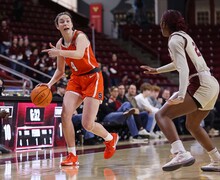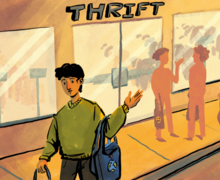Make it mesh: Students promote literacy through biannual magazine, workshops
Andy Casadonte | Art Director
Syracuse University students are bridging the gap between the community and the university, one stanza at a time.
On Tuesday, Merging Expression and Scholarship through High Schools, or MESH, launched a GoFundMe promotional video to raise money in support of its educational pursuits for Syracuse City School District students. With a fundraising goal of $10,000, the group aims to host more on-campus events, aid the publication of its biannual magazine and bring its students to the university for poetry slams.
In its first year as a recognized student organization, MESH has made it its mission to advocate for reading and writing proficiency at local Syracuse schools. Originally founded in 2009 by alumna Christiona Hawkins after a dream of starting an SU publication, the group has since run weekly poetry workshops throughout local middle schools.
According to data gathered by The New York Times, the English language test scores for middle school students in the Syracuse City School District are low: About 25 percent of eighth-graders scored at or above expected levels. At Danforth Middle School, approximately 9 percent of the seventh-grade students pass English tests each year, while zero percent pass with what’s considered “advanced proficiency.”
“We want to bridge the gap between the prestige of the university and the need of the students,” said Christopher Whitehead, MESH president and senior policy studies major. “We just want them to know that college is in their reach, higher learning is in their reach, and there’s nothing outside of their reach. We want to break that barrier down.”
Once a week and all day on Fridays, multiple SU juniors and seniors drive to Danforth and Expeditionary Learning middle schools to workshop with seventh-and eighth-grade English classes. Each workshop begins with an interactive activity designed to stimulate thinking, promote self-expression and produce ideas for writing.
By incorporating lessons about friendship, bullying and self-confidence, the MESH mentors hope to support the kids beyond their academic pursuits. While some students may have not immediately expressed an interest in writing poetry, by the end of the workshops, the majority hand their work over to their mentors or proudly recite their poems in front of the class.
“I think there are kids who really love the program, love what they are able to do, how it makes them feel, how writing makes them feel,” said Alexander Sammartino, a MESH mentor and English and textual studies and philosophy major. “I also think, for some kids, it’s just about knowing people care about them.”
Expeditionary Learning Middle School teacher Elizabeth Buecher said she has seen the change in her students’ confidence. And while she admitted the students can be shy or unsure at first, the MESH mentors always encourage and motivate them.
“This is my fourth year working with MESH, and I’ve seen the tremendous impact it’s had on my kids, short and long term,” Buecher said. “Last year, at the release event, I had students from all three years I’d worked with MESH come together and share their work and talk about how MESH helped them find their voices as writers.”
The short stories and poems produced by the students during these workshops, as well as SU student work will be published in MESH’s magazine. Hawkins and her co-editor Corinne Halpern published the first issue in the spring of 2010 as an outlet for both university and local students.
This is the first semester the magazine will be published without Hawkins as the editor. Current editor in chief and junior magazine journalism major Alyssa Ford explained how her original vision entailed feature stories on artists around campus, but as the semester has passed, she realized the magazine isn’t necessarily for the campus.
“The magazine is for the kids, so they can have their work in a magazine — to show them they can do big things, can write great work and have it published, to build their confidence and have them believe in themselves,” Ford said.
Last semester, the organization held March to College Day, where it brought middle school students from the workshops to see the campus, perform poetry and celebrate their achievements. MESH intends to throw a similar event next semester, which is one of the organization’s biggest goals for the coming year, along with expanding MESH into high schools. The group is also looking to increase student membership to accommodate expansion to high schools and start after-school programs.
MESH’s main focus is to inspire students and encourage them to be their best. Whether it’s through drawing, writing or performing, members of MESH strive to help students find a means of expression.
And although the program’s current middle school students may not all want to be writers, MESH members said that through literacy, students can build the confidence to be anyone or do anything they set their minds to.
Published on November 21, 2013 at 12:28 am
Contact Kelley: kcrowlan@syr.edu





